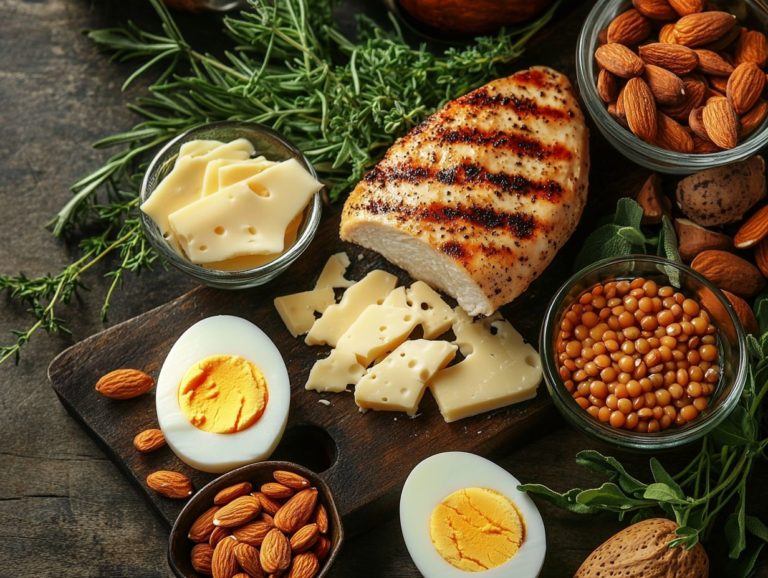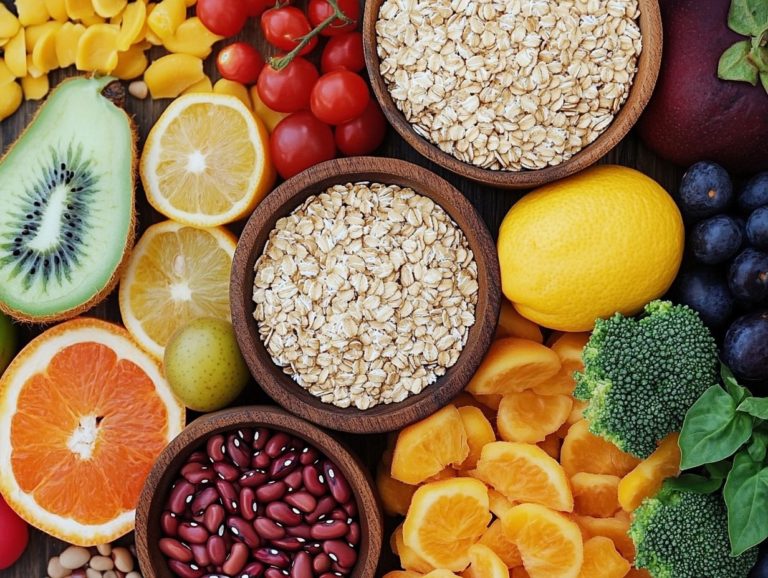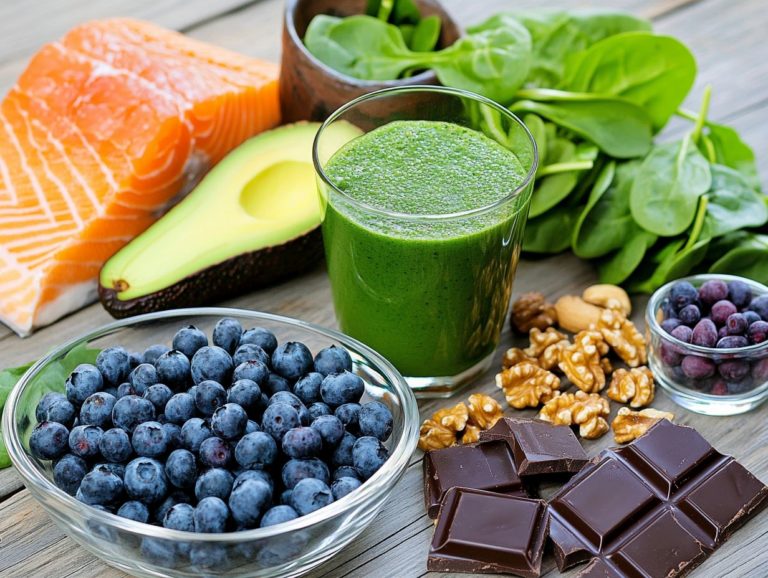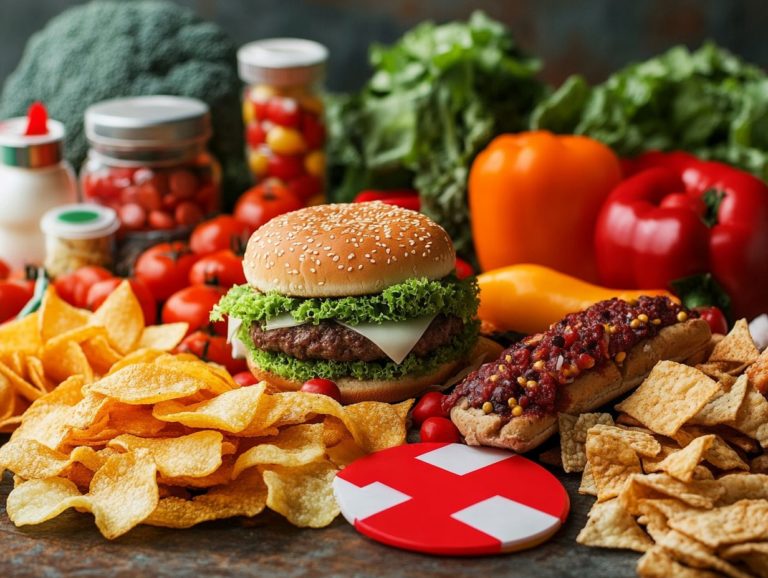How Much Protein Do I Really Need?
Protein is essential for your overall health. It serves as the building block for your muscles, skin, and organs.
You might be wondering: how much protein do you really need? This article explores the importance of protein, the factors influencing your needs, and how to calculate your personal requirements.
We’ll look at the risks of consuming too much protein and share tips for incorporating plant-based sources into your diet.
Whether you re a fitness enthusiast or just looking to improve your nutrition, this guide has insights for everyone.
Contents
- Key Takeaways:
- Understanding Protein Needs
- Factors That Affect Protein Requirements
- Calculating Your Personal Protein Needs
- Potential Risks of Consuming Too Much Protein
- Getting Enough Protein on a Plant-Based Diet
- Frequently Asked Questions
- 1. How much protein do I really need in a day?
- 2. Can I get enough protein from a vegetarian or vegan diet?
- 3. Is it possible to consume too much protein?
- 4. Do I need to consume protein immediately after a workout?
- 5. How can I track my protein intake?
- 6. Can I get enough protein from just food sources or do I need supplements?
Key Takeaways:
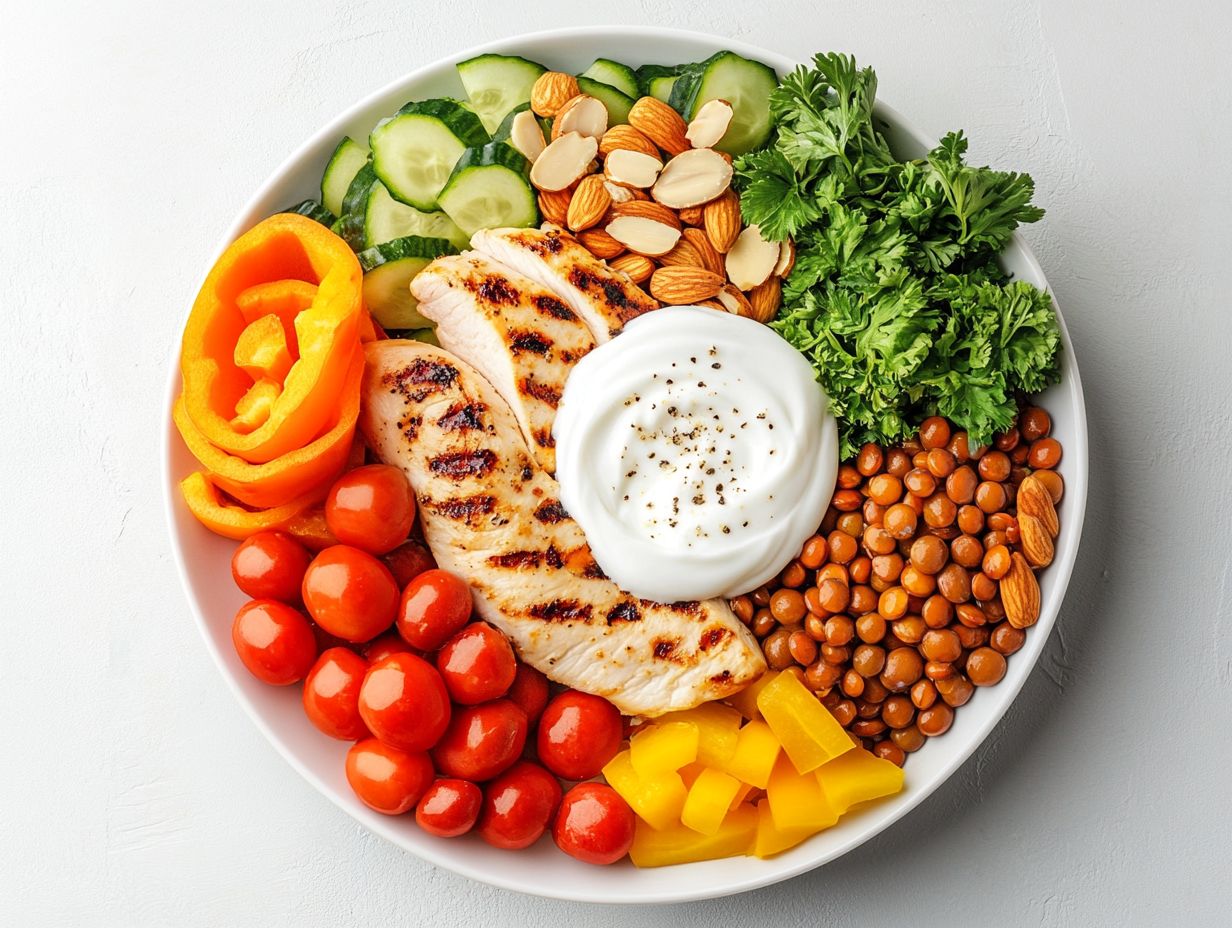
Protein is an essential nutrient with vital functions in the body. Factors like age, activity level, and health conditions affect how much protein you need. It s crucial to determine your personal protein needs to avoid health risks linked to excessive intake.
Understanding Protein Needs
Knowing how much protein you need is key to staying healthy. Many American diets overlook this crucial nutrient.
The National Academy of Medicine outlines specific protein amounts necessary for supporting vital functions and promoting muscle mass, especially as you age.
Ignoring these needs can lead to protein deficiency, harming your health and potentially contributing to issues like obesity or muscle loss due to aging.
Recognizing protein’s essential role in your diet is vital for improving your nutrition.
Defining Protein and Its Importance
Protein is a nutrient made of building blocks called amino acids, which are critical for various bodily functions, including muscle growth and tissue repair.
This vital nutrient supports not just muscle development but also hormone production, immune function, and overall energy levels.
If you’re looking to boost your protein intake, you have plenty of options. Lean meats like chicken, turkey, and fish offer high-quality protein with little saturated fat.
If you prefer plant-based choices, legumes, nuts, seeds, and whole grains are fantastic alternatives that provide amino acids along with additional health benefits.
Generally, adults should shoot for about 1.6 to 2.2 grams of protein per kilogram of body weight, depending on activity level and health goals. Getting enough protein is essential for anyone wanting to eat well and feel great.
Factors That Affect Protein Requirements
Many factors influence your protein needs, including age, activity level, and specific health conditions. Assessing these variables is crucial for determining your optimal protein intake.
As you age, particularly in older adulthood, your protein needs may increase to help combat muscle loss. If you re very active or managing health issues like obesity or chronic diseases, you might also need more protein to aid recovery and maintain muscle health.
Age, Activity Level, and Health Conditions
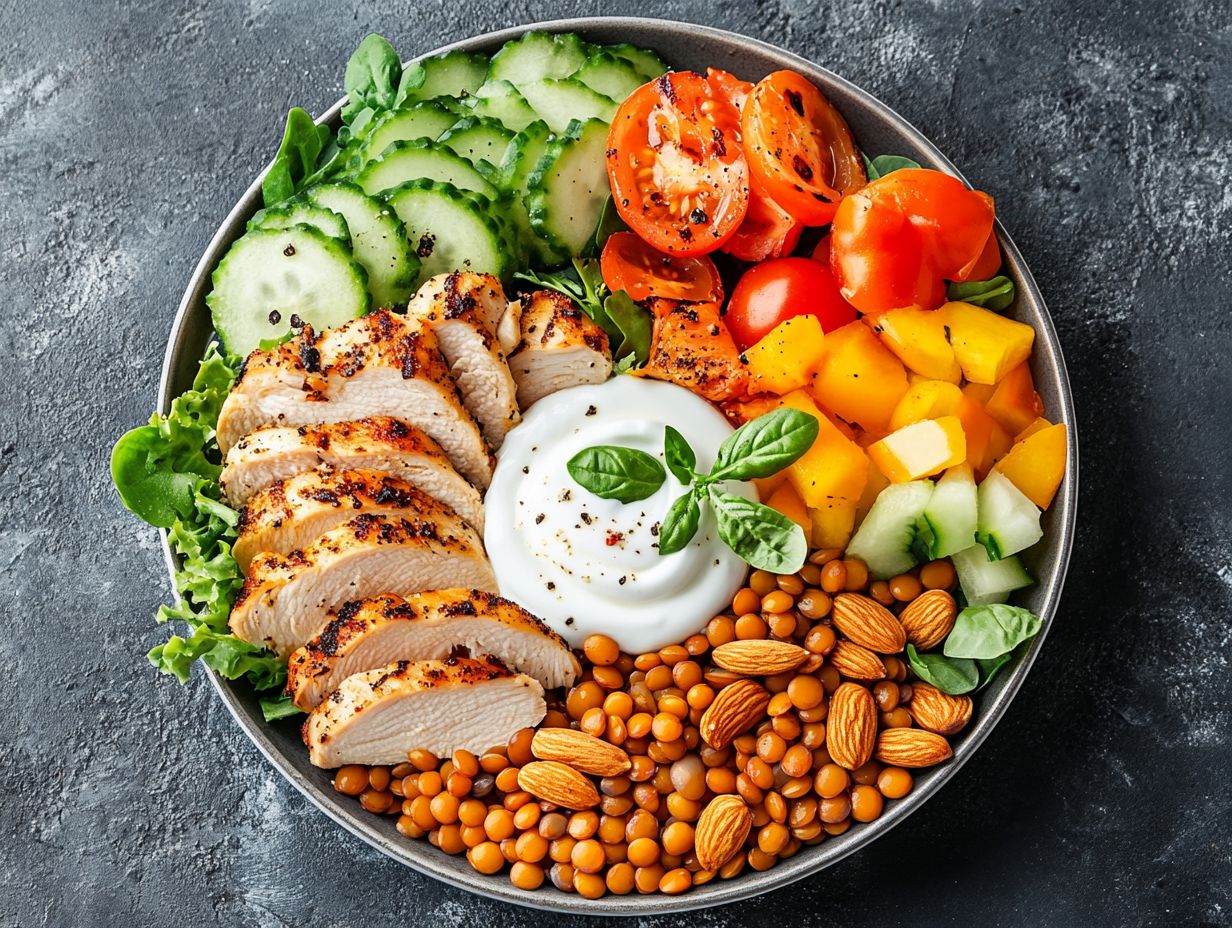
Age, activity level, and existing health conditions are key factors that shape your protein needs throughout life.
During childhood, when growth is rapid, children typically require more protein per kilogram of body weight than adults.
As you become an adult, your protein needs may stabilize. However, if you re active, like a committed athlete, you ll often need more to support muscle repair and growth.
Conversely, as you age, your protein requirements may rise, especially as you deal with muscle loss due to aging.
If you’re recovering from surgery or managing chronic illnesses, you may also need more protein for healing and maintaining overall health.
Understanding these nuances empowers you to tailor your dietary choices to meet your needs at different life stages.
Calculating Your Personal Protein Needs
Calculating your personal protein needs is a personalized process that factors in your body weight, activity level, and health objectives, ensuring you meet the dietary needs essential for optimal well-being.
For most people, a standard guideline suggests consuming between 1.2 and 2.0 grams of protein per kilogram of body weight, influenced by variables such as age, sex, and physical activity levels.
This customized approach allows you to adjust your protein intake effectively, supporting muscle growth, enhancing recovery, and promoting overall wellness.
Determining the Right Amount for You
Determining the right amount of protein for your unique needs involves a careful evaluation of your activity levels, health conditions, and dietary preferences to craft a balanced nutritional approach.
Looking closely at your lifestyle choices whether you’re more sedentary or highly active can provide valuable insight into your protein requirements. If you’re aiming to build muscle, you may find that your protein needs are higher than those of someone simply focused on maintaining their current weight.
Some health issues may require increased protein intake to support healing and ensure optimal muscle function. It’s crucial to consult with healthcare professionals to personalize your protein targets effectively.
Achieving balance is key, ensuring that you incorporate a variety of nutrients while adjusting your protein levels as needed.
Potential Risks of Consuming Too Much Protein
While ensuring you have an adequate intake of protein is essential for your overall health, be cautious! Too much protein can harm your health.
Overindulging in protein may lead to various health consequences, particularly in relation to your kidney and heart health.
Health Consequences and Warnings

Excessive protein consumption can lead to an increased risk of kidney disease and heart disease, particularly for those with pre-existing conditions. The kidneys, your body s waste filtration system, can struggle to keep up when faced with high levels of protein, potentially leading to long-term damage.
Diets that are heavy in red and processed meats can elevate cholesterol levels, raising red flags for cardiovascular health. If you’re following restrictive dietary patterns, you might overlook essential nutrients that carbohydrates and fats provide, which are crucial for overall body function.
It’s crucial to maintain a balanced diet that includes a variety of foods supporting your well-being. Pay attention to how your body responds to dietary changes, ensuring a healthier lifestyle for the long haul.
Getting Enough Protein on a Plant-Based Diet
You can easily meet your protein needs on a plant-based diet by incorporating a diverse array of protein sources. Explore exciting options like legumes, vibrant vegetables, wholesome grains, and even specialized items like protein bars. This variety helps ensure you’re getting sufficient protein to support your lifestyle.
Plant-Based Protein Sources and Tips
Plant-based protein sources are wonderfully diverse and include legumes, whole grains, nuts, seeds, and even specially formulated protein bars, giving you plenty of options to meet your dietary needs.
As you explore these choices, you’ll discover a range of protein content; for example, lentils pack about 18 grams of protein per cooked cup, while quinoa is a complete protein that contains all nine essential amino acids, with approximately 8 grams.
Incorporating a variety of these sources is crucial for maximizing health benefits, such as improved heart health and better digestion, thanks to their rich fiber content.
When planning your meals, consider combining legumes with whole grains, like rice and beans, to create satisfying complete protein dishes. Tossing in nuts and seeds to your salads or smoothies not only boosts protein intake but also provides healthy fats and micronutrients, elevating your overall nutrition to new heights.
Frequently Asked Questions
1. How much protein do I really need in a day?
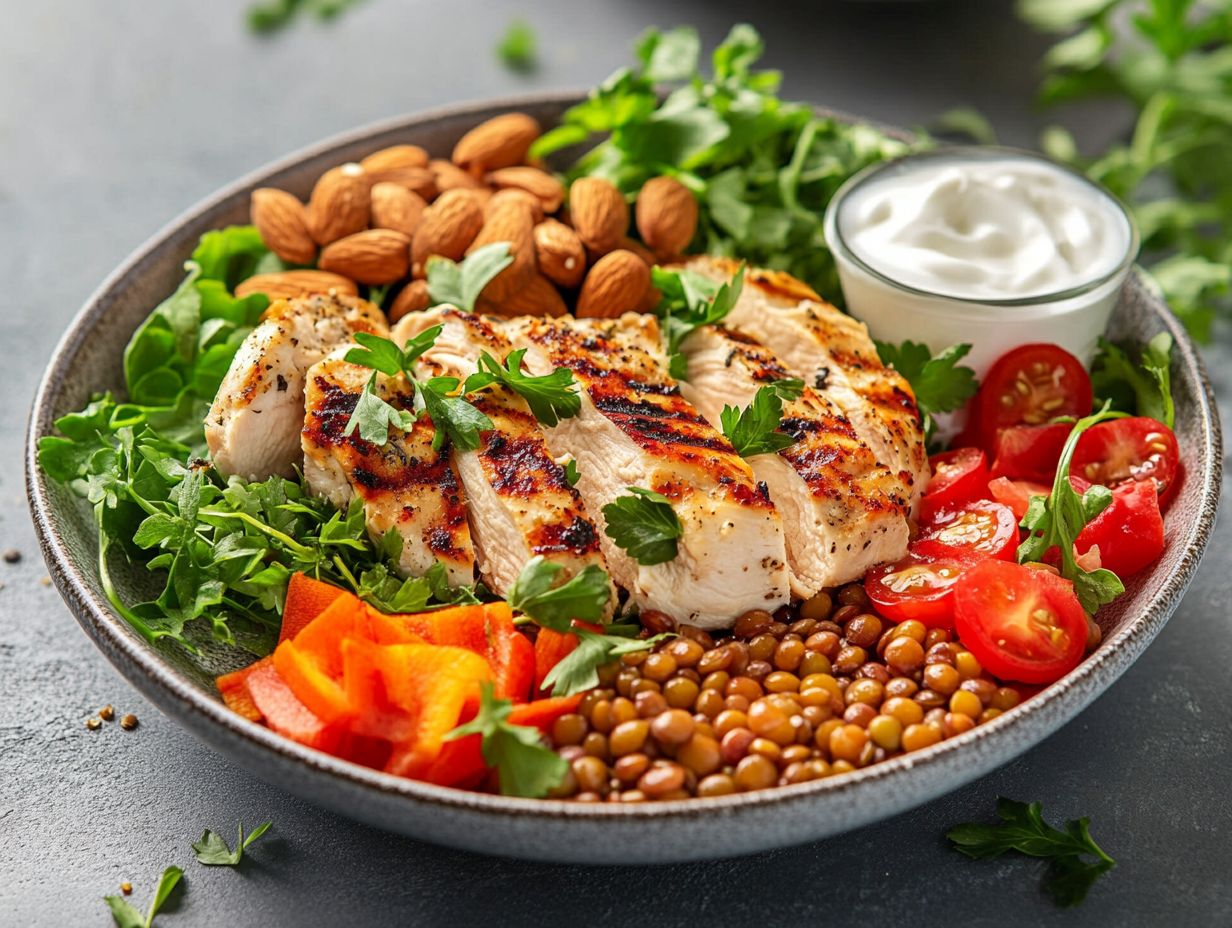
Your daily protein needs depend on factors like age, gender, weight, and activity level. Adults should aim for about 0.8 grams of protein per kilogram of body weight.
2. Can I get enough protein from a vegetarian or vegan diet?
Yes! A vegetarian or vegan diet can provide enough protein if you choose wisely. Beans, lentils, tofu, tempeh, nuts, and seeds are great sources.
3. Is it possible to consume too much protein?
Yes, too much protein can harm your health, risking kidney damage and weight gain. Stick to the daily protein amount to avoid these issues.
4. Do I need to consume protein immediately after a workout?
You don’t have to eat protein right after a workout. However, spreading out your intake throughout the day helps with recovery and muscle growth.
5. How can I track my protein intake?
Use apps like MyFitnessPal, MyPlate, or Cronometer to track your protein intake. You can also jot down your meals in a food journal or consult a dietitian for advice.
6. Can I get enough protein from just food sources or do I need supplements?
You can meet your protein needs with food alone. If you find it hard, supplements can help but shouldn t replace whole foods in your diet.

